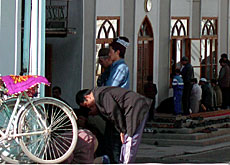
Central Asia battles radical Islam

The ideological vacuum left by the collapse of the Soviet Union has fuelled resurgent interest in radical Islam throughout Central Asia.
Anxiety at the growing strength of Islamic groups has prompted crackdowns by the governments of Kyrgyzstan, Uzbekistan and Tajikistan.
In Kyrgyzstan, bans have been introduced against the secretive and radical Islamic group Hizb-ut-Tahrir al-Islami (the Party of Islamic Liberation), which agitates for the creation of an Islamic state.
Kyrgyz officials told swissinfo that the group represents a direct threat to the stability and security of the region.
“We don’t want fundamentalism in our country,” Djoomart Otorbaev, a government minister said.
“We want people to lead the life they prefer to lead and sometimes this very aggressive approach of Hizb-ut-Tahrir is not welcome,” he added.
The government has responded by arresting members of the group, and using security services to monitor its activists.
The group is also under heavy repression in neighbouring Uzbekistan, where there are believed to be around 6,000 “religious prisoners”.
Backlash
The crackdowns have prompted international observers such as the Brussels-based International Crisis Group (ICG) to warn against a potential backlash.
“Repression of its members, and often of those merely associated with them, has radicalised the movement,” the ICG said in a recent report.
Furthermore, it said, heavy-handed repression could “sow the seeds of greater Islamist extremism in the region”.
Although foreign observers remain divided over Hizb-ut-Tahrir’s influence, the group appears to have widespread support, especially in and around the Fergana Valley area.
swissinfo travelled to a mosque outside the southern Kyrgyz city of Osh and spoke to Aiup Valiev, a senior member of the banned group.
“The whole world oppresses us, not only our government,” Valiev said.
“America controls all the world, but not for long, only for a short period of time… you will see,” he said.
US presence
Valiev said it was the mission of Muslim people to make European countries, as well as America, “believe in Islam”.
Experts say the magnetism of Islam is growing in the region, as poverty and political alienation deepen, particularly among younger men.
“It provides young men with some meaning and structured belief in an era of otherwise confusing and difficult social change,” the ICG report said.
Adding to the tension is the presence of a United States-led air force base on the outskirts of the capital, Bishkek.
Originally opened in 2001 as a base from which to launch military operations in Afghanistan, the facility has gradually expanded.
Half a dozen military aircraft tankers, as well as a jumbo jet belonging to Evergreen International Airlines – a logistics firm historically linked to the Central Intelligence Agency – were parked at Bishkek’s main airport on the day swissinfo passed through.
Although US forces have been active in the region on a “temporary” basis since the mid-1990s, there is an ever-growing suspicion that their presence may be more permanent.
“What if some country invaded your country,” one Hizb-ut-Tahrir member asked swissinfo.
“What would you feel about that? Our feelings are the same,” he said.
Jungle ideology
This has helped fuel doubts among sections of the population about the motives of outsiders in the region.
Although the Swiss government and Swiss NGOs spend millions of francs in Kyrgyzstan on humanitarian aid, Islamists such as Valiev believe the money is part of a Western plot to exploit the region.
“You want to make us like slaves here because of your investments,” Valiev told swissinfo.
“Your ideology is jungle ideology,” he added.
The experiences of the past ten years have only added to that impression. Most of Kyrgyzstan’s industries have been sold off to foreigners, often at rock-bottom prices.
And on most days, dozens of trucks laden with Kyrgyz scrap metal climb over the mountain passes of the ancient silk route into China.
Although they earn income for traders, the trucks are actively assisting an erosion of the country’s wealth.
Violent splinter groups
The views of people such as Valiev have alarmed Central Asian governments, which are watching closely for signs that Islamic groups may have become willing to take the next step towards violence.
Alexy Sukhov, an Osh-based freelance journalist, says disgruntled Hizb-ut-Tahrir members recently formed a splinter group.
“They say that this group will act more radically,” Sukhov said.
“And certainly if this splinter group uses force, I’ll be very anxious about it, as a simple citizen.”
There is evidence that for many ordinary Kyrgyz, educated under the secular Soviet system, radical Islam remains unwelcome.
But with government repression on the increase, sometimes with the tacit approval of Western governments, some fear that Central Asia may become another cauldron of Islamic radicalism.
swissinfo, Jacob Greber and Philippe Kropf in Osh
Hizb-ut-Tahrir al-Islami (the Party of Islamic Liberation) campaigns for the non-violent creation of an Islamic state.
The group first emerged in the early 1950s among Palestinians in Jordan.
Widespread throughout the Middle East, it has been active in Central Asia since the mid-1990s.
Its central aim is the non-violent creation of an Islamic state
There are believed to be around 20,000 members in Central Asia.
The Kyrgyzstan government has banned the group, while in Uzbekistan members are actively targeted and jailed by security forces.

In compliance with the JTI standards
More: SWI swissinfo.ch certified by the Journalism Trust Initiative

























You can find an overview of ongoing debates with our journalists here . Please join us!
If you want to start a conversation about a topic raised in this article or want to report factual errors, email us at english@swissinfo.ch.